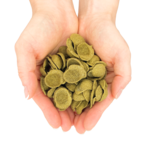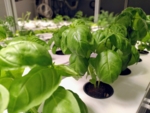-
Paper production from plant fibres - 20/01/2021

Many consumers don't care about exactly how their paper packaging is made and what it is made of as long as it is "eco". But even producing recycled paper, trees need to be felled. An alternative could be paper made from cup plant. Together with partners, a company called Silphie Paper has developed concept for obtaining fibres for a new type of grass paper, while also producing heat, energy and nutrients for natural fertilisers.
https://www.biooekonomie-bw.de/en/articles/news/one-cycle-ecopaper-energy-and-fertiliser-made-silphium-perfoliatum
-
-
Press release - 26/01/2021
The University of Warmia and Mazury in Olsztyn, Polish partner of the BalticBiomass4Value project, published a report which maps biomass value chains for improved sustainable energy use in the Baltic Sea Region countries. The research focuses on the 9 Baltic Sea Region (BSR) countries: Denmark, Germany, Estonia, Finland, Latvia, Lithuania, Poland, Sweden, and Norway.
https://www.biooekonomie-bw.de/en/articles/pm/report-mapping-biomass-value-chains-improved-sustainable-energy-use-baltic-sea-region-countries-published
-
-
-
-
Press release - 23/02/2021
The European Commission agreed on the successor of BBI JU – the Circular Bio-based Europe Joint Undertaking (CBE JU) in a legislative proposal adopted today. The new partnership between the EU and the Bio-based Industries Consortium (BIC) is expected to build on the success of BBI JU while stepping up its contribution to the EU’s climate targets, in line with the European Green Deal. The European Parliament and Council will now study the…
https://www.biooekonomie-bw.de/en/articles/pm/commission-gives-green-light-successor-bbi-ju
-
Press release - 20/04/2021
Protecting the global climate is an undertaking that presents both industry and society with a major task. It will not be possible to achieve the climate targets simply by limiting global emissions, by saving carbon dioxide (CO2). This is because there will continue to be unavoidable CO2 emissions that will nevertheless have to be compensated.
https://www.biooekonomie-bw.de/en/articles/pm/cellulosefasern-gegen-den-klimawandel
-
-
-
-
Paper technology - 10/03/2021
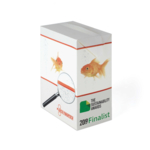
Plastic is indispensable: it is cheap and practical and found in many disposable products such as drinking straws, disposable tableware or even packaging like bonded beverage cartons or bags – and it has a disastrous effect on the environment. The start-up company Plafco Fibertech Oy has developed a sustainable plastic substitute made of paper that could replace many disposable plastic products in the future.
https://www.biooekonomie-bw.de/en/articles/news/plafco-sustainable-plastic-substitute-made-paper
-
Alternative source of protein - 07/04/2021
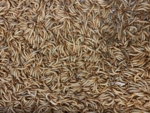
It is estimated that by 2050, if not before, the world's population will have grown so much that it will be difficult to provide adequate supplies of food for everyone. It is therefore high time to look for alternatives. One option could be insects as an environmentally friendly source of protein for humans and animals. The start-up company Cepri is developing smart insect farms with the goal to make primary production, which is not yet…
https://www.biooekonomie-bw.de/en/articles/news/smart-insect-farms-sustainable-protein-sources-future
-
-
Press release - 03/05/2021
The amount of plastic waste increases every year. Some of this waste is due to plastic packaging used to protect food. As part of the “BioActiveMaterials” project, researchers at the Fraunhofer-Gesellschaft have developed an eco-friendly coating for paper packaging. With this, not only is plastic saved, but the coating of plant-based proteins and waxes also extends the shelf life of the food.
https://www.biooekonomie-bw.de/en/articles/pm/bioactive-paper-coatings-replace-plastic-packaging-foods
-
-
-
Press release - 18/05/2021
The Bio-based Industries Joint Undertaking (BBI JU) has signed the grant agreements with 18 new projects, selected for funding under the 2020 Call for proposals. 199 beneficiaries from 26 countries across the EU and beyond will receive BBI JU’s financial support worth €104.5 million. This is the seventh and last BBI JU call which will bring the total investment of the initiative to €821.6 million and the BBI JU’s portfolio to 142 projects.
https://www.biooekonomie-bw.de/en/articles/pm/bbi-ju-invest-eur1045-million-circular-bio-based-projects
-
-
-
Press release - 27/05/2021
The pulp of coffee beans is considered a waste product on coffee plantations, which is usually thrown away or dumped into rivers - with significant negative consequences for climate change and the environment. Macarena San Martín-Ruiz from the University of Stuttgart is working with Coopetarrazú, the largest coffee cooperative in Costa Rica, to find out how the mixture of pulp and husks can be turned into organic compost and thus protect the…
https://www.biooekonomie-bw.de/en/articles/pm/coffee-s-pulp-waste-becomes-organic-compost
-
-
Start-up kernique catch the zeitgeist - 29/06/2021
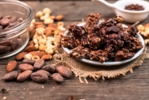
A delicious vegan nut snack that uses no sugar, artificial additives, gluten or palm oil, is full of essential nutrients, and is part of a commitment to environmental and social sustainability. Impossible? An Esslingen-based start-up called kernique proves otherwise. The start-up is currently planning a crowdfunding phase that offers a lucrative deal for investors. The idea catches the zeitgeist, but what exactly makes it stand out?
https://www.biooekonomie-bw.de/en/articles/news/nut-snack-sustainable-ecological-concept
-
-
Alpha-Protein GmbH - 27/07/2021
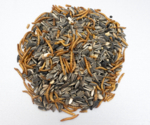
Mealworms instead of fish meal and soybean meal - this is what the sustainable future of feed production looks like as Alpha-Protein GmbH see it. The company has built a highly efficient automated production plant in which residual materials from local food production are used to breed mealworms.
https://www.biooekonomie-bw.de/en/articles/news/insect-farming-sustainability
-
-
Press release - 09/07/2021
Refuels are renewable fuels that can be produced in different ways. When they are mixed and processed such that they meet the existing fuel standards, they are suited for all types of combustion engines. This is the result of the latest vehicle and fleet tests within the project “reFuels – Rethinking Fuels” at Karlsruhe Institute of Technology (KIT). Compared to fully fossil fuels, refuel mixes allow for a CO2 reduction by 25% at least. Moreover,…
https://www.biooekonomie-bw.de/en/articles/pm/refuels-are-suited-wide-use
-
Press release - 15/06/2021
Microorganisms are the oldest, most abundant, and most diverse life forms on earth and offer enormous potential for biotechnological applications. To date, however, only a fraction of them could be isolated and cultivated. The “MicroMATRIX” research project, funded with € 1.5 million by the German Federal Ministry of Education and Research and led by Karlsruhe Institute of Technology (KIT), aims to shed more light on the microbial darkness.
https://www.biooekonomie-bw.de/en/articles/pm/biooekonomie-von-der-wg-ins-mikroben-eigenheim
-
Press release - 07/07/2021
The European Union is largely dependent on imports of white phosphorus (P4), a strategic raw material for the food and pharmaceutical industries. To tackle this challenge, the newly started four-year EU-funded project FlashPhos – led by the University of Stuttgart – will recover at a large scale high-quality white phosphorus and other raw materials using sewage sludge as input material.
https://www.biooekonomie-bw.de/en/articles/pm/schatzsuche-im-klaerschlamm
-
-
Plastics from the field - 12/08/2021
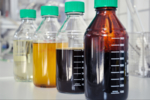
Huge amounts of waste are produced both during food production and by consumers. The Conversion Technologies of Biobased Resources group at the University of Hohenheim’s Institute of Agricultural Engineering has developed a process to convert this biomass into hydroxymethylfurfural (HMF), the highly potent basic chemical that is used to produce plastics.
https://www.biooekonomie-bw.de/en/articles/news/great-potential-biological-residues
-
-
-
Press release - 02/08/2021
Carbon dioxide is one of the main drivers of climate change – which means that we need to reduce CO2 emissions in the future. Fraunhofer researchers are highlighting a possible way to lower these emissions: They use the greenhouse gas as a raw material, for instance to produce plastics. To do this, they first produce methanol and formic acid from CO2, which they convert via microorganisms into building blocks for polymers and the like.
https://www.biooekonomie-bw.de/en/articles/pm/co2-raw-material-plastics-and-other-products
-
-
Compostable nappies - 14/10/2021

In an EU-funded project, the Tübingen-based biotech company Novis is working with international partners to develop a fully compostable nappy that contains no plastic parts. This could reduce the huge quantities of used disposable nappies that have been produced to date and the enormous costs of disposal, as well as avoiding the greenhouse gases produced when they are incinerated.
https://www.biooekonomie-bw.de/en/articles/news/nappies-sustainable-bioeconomy
-
Press release - 30/08/2021
In August 2021, the BioMat Pavilion 2021 was inaugurated on the campus of the University of Stuttgart in a ceremonial setting and in compliance with the hygiene concept. The core of the elegantly curved lightweight construction is an active-bending structure made of natural fibers, reminiscent of bamboo. It was developed as part of the "LeichtPRO" research project.
https://www.biooekonomie-bw.de/en/articles/pm/biegsam-wie-bambus-belastbar-und-leicht
-
Start-up PROSERVATION - sustainable packaging - 21/09/2021
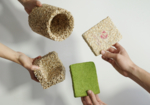
Expanded polystyrene (EPS) packaging is very practical, but it is made from petroleum and is not very environmentally friendly in other ways either. Single-use plastic containers made of EPS have therefore been banned in the EU, but alternatives are also urgently needed. The Stuttgart-based start-up PROSERVATION has developed an ecological packaging material made from grain husks that could replace EPS and be just as effective.
https://www.biooekonomie-bw.de/en/articles/news/husk-substitute-polystyrene-packaging-materials-good-conscience
-
Reduction of greenhouse gases in wine production - 31/08/2021

In the EU project REDWine, the CO2 produced during wine fermentation is captured and used to produce algae biomass. Novis GmbH from Tübingen supplies the complete system for CO2 utilisation. The aim of the project is to reduce the share of global warming caused by wine production in a way that is economical for producers.
https://www.biooekonomie-bw.de/en/articles/news/redwine-project-and-climate-change
-
Press release - 27/07/2021
The Hallertau is Germany's largest hop-growing region. During harvesting, hop bine chaff is left over, which is converted into environmentally friendly bio natural gas on site in a biogas plant. But that is not the end of the utilization chain for this fiber plant. Researchers at the German Institutes of Textile and Fiber Research Denkendorf (DITF) have used the plant-containing biogas digestate to produce a composite material that can be…
https://www.biooekonomie-bw.de/en/articles/pm/furniture-biogas-plant
-
-
-
-
Specialized in Sustainability - 30/09/2021
The research project RUN (Rural Urban Nutrient Partnership) explores how waste might be used more efficiently as a resource. In this project, Veronika Fendel investigates how recyclable materials from biowaste and domestic wastewater can be fed back into the material cycle in the best possible way.
https://www.biooekonomie-bw.de/en/articles/pm/circular-economy-future
-
Dossier - 17/11/2021
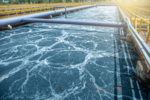
Sustainability is in vogue. And it’s not a question of wanting to be sustainable, but having to be: as the latest report from the Intergovernmental Panel on Climate Change shows, protecting the climate and the environment calls for swift action. Biorefineries that use renewable raw materials and recycle industrial raw materials are playing an important role in the bioeconomy concepts of many countries - including the state of Baden-Württemberg.
https://www.biooekonomie-bw.de/en/articles/dossiers/biorefinery-new-paths-build-our-tomorrow
-
-
Climate-friendly circular economy - 11/11/2021
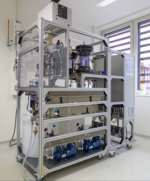
A Fraunhofer team has successfully produced a dye using CO2 adsorbed from the air. The aim is to move towards a climate- and resource-friendly circular economy. Chemicals, as well as fuels, can be produced cost-effectively using this process. How does the technical process work, and what opportunities does it open up?
https://www.biooekonomie-bw.de/en/articles/news/co2-air-raw-material-chemicals
-
Press release - 12/01/2022
Chitin is the main component of insect carapaces and ensures that they are both stable and flexible. The Chitinfluid research project, funded by the Carl Zeiss Foundation, focuses on the use of chitin in construction and aims to process chitin and its derivatives into sustainable materials. In a hybrid symposium under the auspices of Prof. Sabine Laschat from the University of Stuttgart, the project team discussed the current state of research…
https://www.biooekonomie-bw.de/en/articles/pm/insect-carapace-sustainable-building-material
-
-
Protection against game damage - 13/01/2022
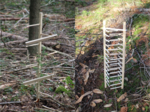
Young forest plants need protecting against damage and as a result it’s often hard to miss the colourful plastic tree guard sleeves when out walking in forests. These tree guard sleeves are neither pleasing to the eye nor sustainable. Bernd Schairer UG from Albstadt has developed sapling protectors made of wood that contain no plastics, metals or chemicals, do not require removal and disposal, and are produced in a socially responsible way.
https://www.biooekonomie-bw.de/en/articles/news/sapling-protectors-made-domestic-wood-simple-effective
Website address: https://www.biooekonomie-bw.de/en/search



